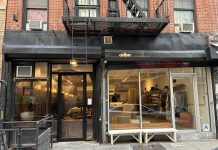
The clashes between residents and bar owners at Community Board 3 meetings are fairly legendary. But last night, these groups were pushed to the sidelines, as a high profile member of CB3 raged against what he considers to be a pattern of inconsistent and unfair decisions by the board’s SLA Committee.
David McWater is a former chairman of CB3 and for the past 10 years (off and on) has served on the committee that evaluates liquor license applications. He also happens to be the owner of several bars in the neighborhood. In the past, he has spoken out about decisions that, in his view, harm good operators just trying to make their businesses succeed. But last night, his frustration rose to a whole new level.
McWater’s agitation centered around an application from a mother-and-son team hoping to take over the old Butterfly space at 14 Avenue B. They plan to open up a catering company, restaurant and lounge by combining the restaurant with the space next door, a former deli. Rather than applying for a new liquor license, they wanted to transfer the existing license from Butterfly’s owner. A number of community activists came to oppose the application, arguing that the block is already saturated with bars and restaurants. Mary Spink, who manages several apartment buildings on East 2nd Street, said Avenue B simply cannot absorb more cars and more people.
Several members of the committee agreed. They noted that there had been numerous community complaints about Butterfly. But McWater said there was a bigger principle at stake: a business owner has the right to sell his license. Even if a particular owner is a “bad operator,” he said, revoking licenses sets a dangerous precedent:
Once we start voting against transfers, we change the rules on an entire class of people… They were here. They were the employment base and tax base for a long time. Some of us have been in business 17 or 18 years. I’ve had literally thousands of people work for me now. To change the rules on all of us now and say, ‘your license is no good. You can’t sell it, you can’t transfer it – is unfair…It’s a precedent. Once we say, ‘this guy can’t,” then next thing they’re saying is ‘that guy can’t.’ We’ve seen this in every aspect of the SLA debate over the years. People came here and said, “I only want the bad bars to have law enforcement.’ Now we have massive law enforcement raids on everybody – good, bad, indifferent. So it’s a slippery slope. I realize they are expanding into the store next door and I take that seriously. I feel like it’s a fairly benign enhancement.
Other members of the committee said they might agree with McWater’s point of view if it was a “straight up transfer” being considered. But since the applicant was also seeking an expansion, they didn’t feel it was a straightforward case. The committee rejected the proposal — but McWater did not let the issue go.
A few minutes later, there was another kerfuffle over the fate of the A&D Wine Corp (65 2nd Avenue). After the committee voted to reject the application, McWater turned to a public member of CB3, Helen Serebin, who voted no. ” I’m out of here,” McWater said. “Who appoints a public member who votes against every frickin’ license. If you’re going to put someone on this board who has an agenda to vote against every single – this is a transfer for crying out loud!” Serebin responded that she did not always vote “no.”
The committee then turned its attention to an application from the Horse Box (218 Avenue A). As a resident was arguing that the neighborhood had become over-saturated with bars, McWater interjected:
McWater: You don’t think the person who owns this business has any right to sell it? They have no legal rights, only you do? That’s your position?
Resident: I’m sorry I don’t know you personally. What are you attacking me for? For stating an opinion?
McWater: Your opinion is that the person who owns this business has no right to sell it.
The resident responded that he felt eight bars in a two block stretch was excessive. A woman who had attended the Nightlife Town Hall at P.S. 20 last week, highlighted the fact that SLA chief Dennis Rosen had said all applications, including transfer applications, are considered on a case-by-case basis. She asked if McWater was saying transfers should simply be “rubber-stamped.”
McWater: When this person built this business and invested in this business, they did so with the understanding that they could sell it… I understand what saturation means and I understand it’s a bad thing, and I’ll vote against new bars in these crowded areas, but what people are suggesting now is that you take away the equity of the person who started that business had… It would be the same thing is if I went to your place of work and said you know what i don’t think you should have a retirement fund anymore.
Two-and-a-half hours into the meeting the committee finally got to the most anticipated item of the night, a request from Freemans to expand to the second floor and to add an additional bar. In the fall, CB3 rejected the application in the face of strong opposition from several residents, who complained about late night noise emanating from Freemans Alley. Last night, co-owner Taavo Somer explained he had complied with several directives from the committee, including the removal of a bench located outside and the purchase of low-noise trash bins.
Meghan Joye, a CB3 member who is also a bar owner, said she was inclined to support the application. McWater said he didn’t understand why she would vote against 14 Avenue B, but yes on Freemans:
Meghan, your position is that, in the instance of Freemans, it’s okay to add several thousand extra square feet… but on 14 Avenue B, a transfer where they wanted to add 14-hundred extra square feet, that was no good.
Joye countered that, on Avenue B, the owners were asking to take over new space that wasn’t already part of the restaurant. Another member, Ariel Palitz (another bar owner) said Freemans had done everything the community board asked. But McWater held his ground, noting that Freemans had received more than 20 311 complaint calls. At this point, a lawyer for restaurant, Frank Palillo, became exasperated, and proved McWater wasn’t the only one in the room with a flair for the dramatic:
You’re sending the message to bars and restaurants, ‘don’t bother to work with the community board. Ignore them.’ That is the message you’re sending right now. Because you’re angry about 14 Avenue B? That is absurd. (Raised voice): You’re flat out telling these people, don’t bother working with the community board. Come on, it’s not right. They’re not bad operators. They’re not people who flaunt before you and say we’ll do whatever we want. It isn’t right.
And Freemans co-owner Taavo Somer made his case directly:
Aside from disappearing, what can we do to make you happy, because we’ve done everything else on this list that was brought up by the community board? If we go away, the landlord is going to rent that space to someone else.
In the end, Freemans prevailed, but without McWater’s vote.









